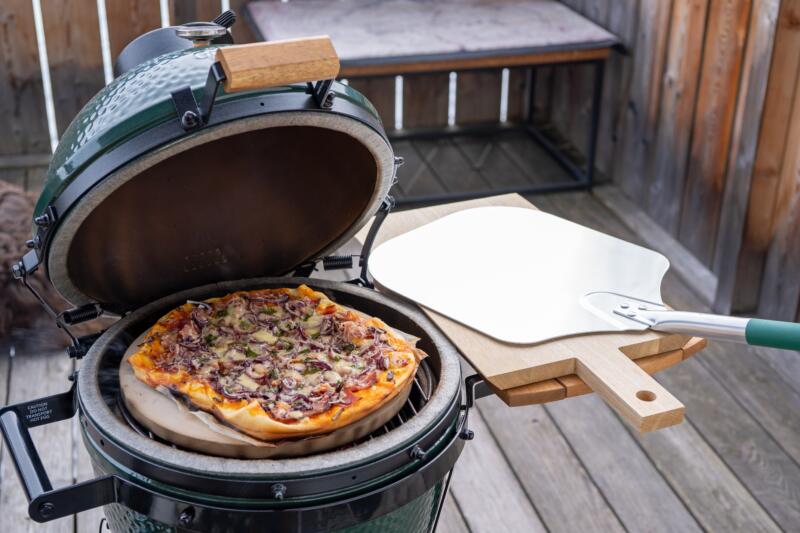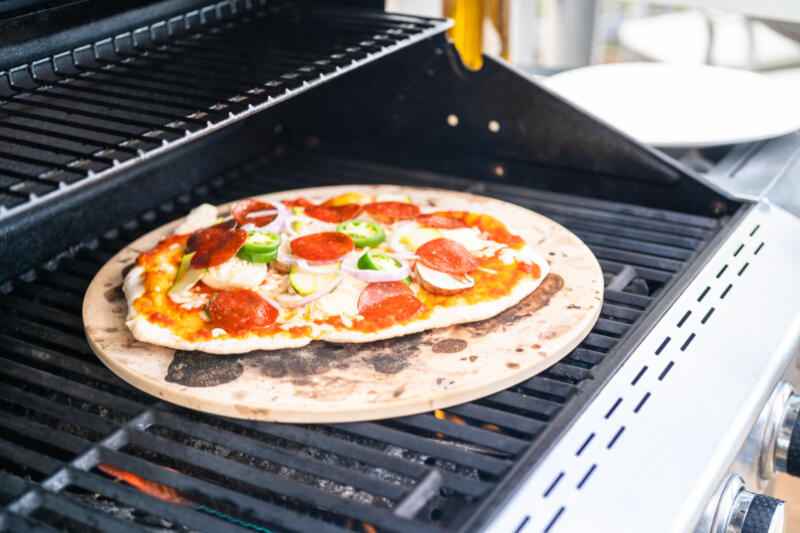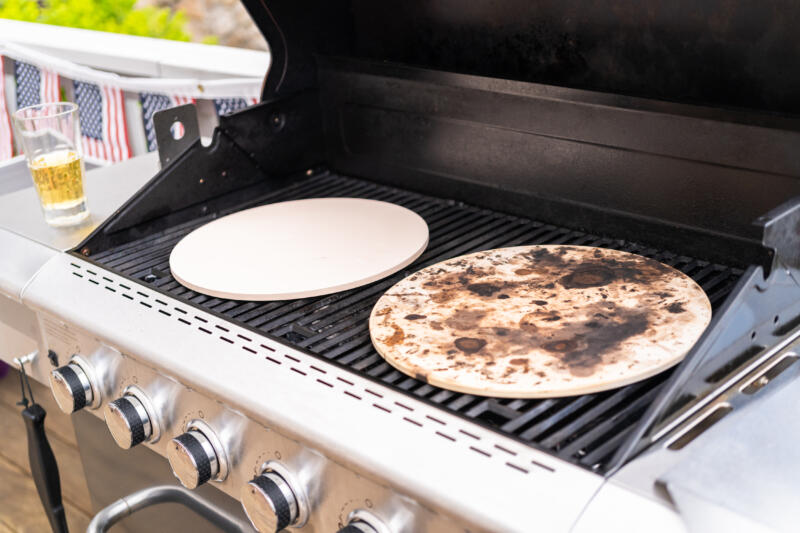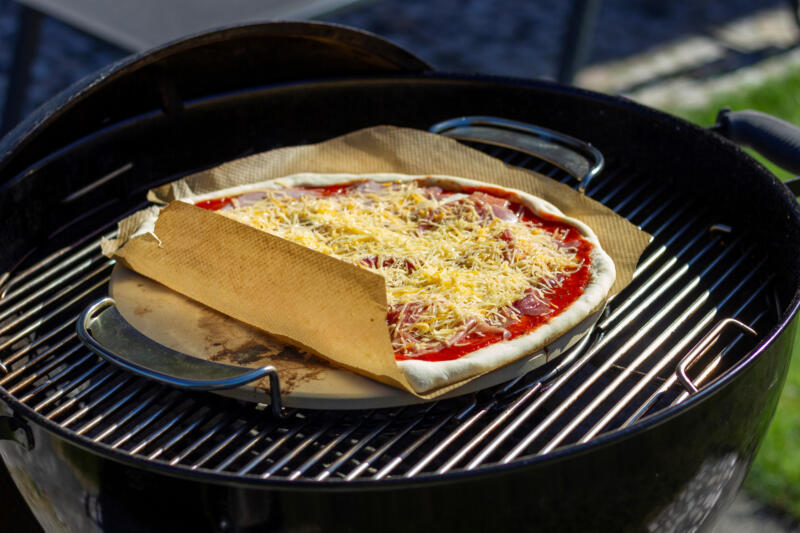I’ve always loved making pizza at home, aiming for that pizzeria-quality crust every time.
So, I invested in a pizza stone, believing it to be my secret weapon.

But then, it started smoking and emitting a strange smell during use, turning my pizza nights into a bit of a headache. It was frustrating, to say the least.
I realized that, like any good kitchen tool, a pizza stone requires proper care and understanding to perform its best. Through some trial and error, I’ve learned not only why my pizza stone was acting up but also how to prevent and fix it.
Let me share some insights that might save your pizza night too.
Highlights
- Avoid Oils and Fats: I learned the hard way that applying oil to a pizza stone or using high-fat toppings can cause smoking and smells. These substances seep into the stone and burn at high temperatures.
- Regular Cleaning is Crucial: Keeping the stone clean from food debris and grease is essential. I use a stiff brush and sometimes a bit of baking soda to scrub it down after it cools, which helps a lot.
- Preheat Properly: I found that gradually heating the stone along with the oven prevents thermal shock and reduces smoking. It also ensures the stone is evenly heated, giving me that crispy crust I love.
In this article:
Understanding Why Pizza Stone Smokes
Pizza stones are porous by nature. This means they have tiny holes or pores that can absorb fats and oils from the pizza you’re cooking.
It’s like a sponge soaking up water, but in this case, it’s your pizza stone soaking up delicious pizza grease.
When these absorbed fats and oils are exposed to high temperatures in your oven, they start to react.
This reaction often leads to smoke and can produce some pretty unpleasant odors. It’s not your pizza stone betraying you, it’s just doing what comes naturally to it.
Common Causes of Pizza Stone Smoking

1. Oil Application
One common cause of a smoking pizza stone is the application of oil.
It might seem like a good idea to oil your stone, but it can actually degrade its integrity and cause it to smoke.
This is because oil has a smoke point – a temperature at which it starts to smoke and burn.
When you heat your oiled pizza stone, it’s not just the pizza that’s cooking, it’s the oil too.
2. Burnt-on Food
Leftover food debris on your pizza stone can also be a culprit.
These remnants can harden and carbonize, leading to smoke when the stone is heated.
It’s like leaving a piece of toast in the toaster for too long – eventually, it’s going to start smoking.
3. Food Oils and Fats
The oils and fats from your pizza toppings can also cause your stone to smoke.
As your cheese melts and your pepperoni sizzles, these oils, and fats can seep into the stone.
When heated, they can cause your pizza stone to smoke, much like the oil application we discussed earlier.
4. Using Flour directly on the stone
Placing flour or cornmeal on the pizza stone before setting your pizza on it can lead to burning. This burnt taste can then permeate your pizza, affecting its flavor.
Over time, this will create debris that might provoke smoking.
That’s why it’s recommended to apply flour or cornmeal solely to the pizza peel.
5. High Cooking Temperatures
High cooking temperatures can exacerbate the smoking issue.
The combination of high heat, oils, and leftover food can create a smoky situation. It’s like a perfect storm for your pizza stone, leading to smoke and unpleasant smells.
6. Infrequent Cleaning
Finally, infrequent cleaning can lead to a buildup of food debris and oils on your pizza stone. When debris is heated, it can cause smoking or create a burnt smell.
How to Prevent and Stop Pizza Stone from Smoking

Avoid Using Oil
While it might be tempting to slather your stone in oil, it’s not necessary and can actually do more harm than good. Don’t forget that your pizza stone is a tool, not a frying pan.
Instead, focus on maintaining the right baking temperatures and let the heat do its job.
When baking your pizza, simply place it directly on the stone without any oil.
The stone’s porous nature will help to draw out the moisture from the dough, giving you a perfectly crispy crust.
To bake pizza effectively, always preheat the stone in tandem with the oven or outdoor pizza oven. Often, pizzas stick to the stone due to insufficient preheating.
Regular Cleaning
Leftover food debris can burn and smoke the next time you use the stone, so it’s best to remove it as soon as possible.
Steer clear of soaps or detergents; they can penetrate the stone’s pores and alter your pizza’s flavor.
Use a scraper to gently remove any food debris.
Maintaining Appropriate Cooking Temperatures
Sticking to the recommended cooking temperatures in your pizza recipe can also help prevent your stone from smoking.
High temperatures can cause any absorbed oils or fats to smoke, so it’s best to keep the heat in check.
When preheating your pizza stone, aim for a temperature of around 450 to 500 degrees Fahrenheit (230-260C).
This is typically the sweet spot for baking pizza, allowing the crust to cook fully without burning or causing the stone to smoke.
Cleaning and Maintenance of Pizza Stones

Regular cleaning and maintenance of your pizza stone can extend its lifespan and ensure it performs at its best.
To clean your pizza stone, follow these steps:
- Wait for the stone to cool down completely after use.
- Use a scraper or spatula to gently remove any food debris from the stone.
- Wipe the stone with a damp cloth. Avoid using soap or detergent as they can seep into the stone’s pores.
- For stubborn stains, use a baking soda paste and scrub gently with a brush.
- Finally, rinse the stone with a damp cloth and let it dry completely before storing it.
Using Baking Soda
Baking soda is a great, natural cleaner for your pizza stone. It can help remove stubborn fats or oils seeping into the stone’s pores.
To clean your pizza stone with baking soda, make a paste by mixing equal parts baking soda and water.
Apply the paste to the stone and scrub gently with a brush.
Frequently Asked Questions

Is It Normal for a Pizza Stone to Smoke?
Yes, it’s normal for a pizza stone to smoke, especially when it’s new or if it has absorbed oils and fats.
However, excessive smoking can be a sign that your stone needs a good cleaning.
If your pizza stone is smoking excessively, try cleaning it with a baking soda paste and a brush.
Can You Overheat a Pizza Stone?
Indeed, a pizza stone can be subjected to excessive heat.
Pushing its temperature limits might result in issues like cracks or scorching. Always consult the manufacturer’s guidelines for the stone’s temperature cap.
Can You Leave a Pizza Stone in the Oven All the Time?
While it’s safe to leave a pizza stone in the oven, it’s not always the best practice.
The stone can absorb heat and increase the time it takes for your oven to preheat.
Additionally, if you’re using your oven for baking or cooking other foods, the stone can get in the way.
When not in use, it’s best to store your pizza stone in a safe, dry place.
Should I Oil My Pizza Stone?
Oiling a pizza stone is generally not recommended. Oil can cause the stone to smoke and potentially damage it.
Instead of oiling your stone, consider using a sprinkle of cornmeal or flour to prevent your pizza from sticking.
This can provide a non-stick surface without the risk of smoking or damage.
Is It OK If Pizza Stone Is Black?
Absolutely! A blackened pizza stone is a sign of good seasoning and frequent use.
It does not affect the stone’s performance. In fact, many pizza enthusiasts believe a well-seasoned, blackened stone produces a better-tasting pizza crust.
So, if your pizza stone is turning black, don’t worry – it’s just showing its experience.
Can You Ruin a Pizza Stone?
Yes, a pizza stone can be damaged if not handled properly. Sudden temperature changes can cause thermal shock, leading to cracks or breaks.
Using soap or detergent to clean the stone can also damage it, as they can seep into the stone’s pores and affect the taste of your pizza.
To prevent damage, always handle your stone with care, clean it properly, and avoid subjecting it to extreme temperature changes.
Closing Thoughts
Proper pizza stone care and maintenance is the secret to a smoke-free, enjoyable pizza baking experience.
It’s about understanding your pizza stone, knowing what causes it to smoke, and taking the necessary steps to prevent it.
We hope this guide has been helpful and informative.
If you have any questions or comments, or if you’d like to share your own pizza stone experiences, we’d love to hear from you.
Happy pizza baking!